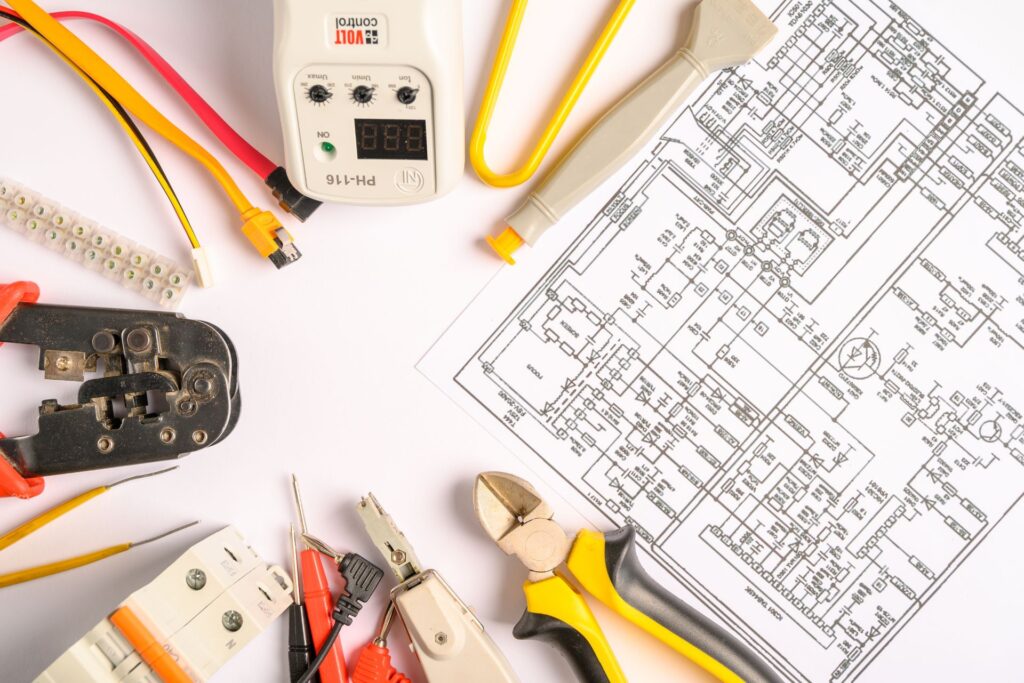Welcome to our exploration of the essential differences between electricians and electrical engineers—two crucial professions in the world of electrical systems. Whether you’re a homeowner facing flickering lights, a business owner in need of system upgrades, or just curious about the fields, understanding these roles is key. This post will illuminate the distinct responsibilities, training paths, and work environments of electricians and electrical engineers. By the end, you’ll not only grasp what sets them apart but also know who to call for your specific electrical needs. Join us as we delve into the fascinating details that distinguish these vital professions.
An electrician is a tradesperson specializing in the installation, maintenance, and repair of electrical systems in homes and businesses. In contrast, an electrical engineer is a professional who designs, develops, and oversees the creation of electrical systems and products, often requiring a higher level of education and working on large-scale projects.
Definitions And Roles
Electrician
Definition
An electrician is a skilled tradesperson specializing in the installation, maintenance, and repair of electrical systems. They work with wiring, circuits, and electrical components to ensure that homes, businesses, and other structures have safe and reliable electrical power.
Primary Responsibilities
Electricians have a wide range of responsibilities that are crucial for maintaining electrical safety and functionality. Their typical tasks include:
Installing Wiring: Electricians lay down electrical wiring in new construction projects, ensuring that the infrastructure supports the building’s electrical needs.
Repairing Electrical Systems: When electrical issues arise, electricians diagnose and fix problems such as faulty wiring, circuit breakers, and electrical panels.
Ensuring Safety Standards: Electricians must adhere to strict safety codes and regulations to prevent electrical hazards. This includes performing safety inspections and using protective gear.
Upgrading Systems: They also upgrade old electrical systems to improve efficiency and meet modern standards, which can involve installing new outlets, lighting systems, and circuit breakers.
Education and Training
Becoming an electrician typically involves a combination of education and hands-on training. The pathway usually includes:
High School Diploma or Equivalent: Basic education is the first step, focusing on subjects like math, physics, and technical drawing.
Apprenticeship: Prospective electricians often enter apprenticeship programs, which provide on-the-job training under the supervision of experienced electricians. These programs can last 4-5 years and include classroom instruction.
Licensing and Certification: After completing an apprenticeship, electricians must pass a licensing exam to become certified. This ensures they have the necessary knowledge and skills to work safely and effectively.
Electrical Engineer
Definition
An electrical engineer is a professional who designs, develops, and manages electrical systems and components. They apply principles of electricity, electronics, and electromagnetism to innovate and improve technology used in a variety of industries.
Primary Responsibilities
Electrical engineers are involved in a broad array of tasks that often extend beyond the practical work handled by electricians. Their responsibilities include:
Designing Electrical Systems: They create blueprints and plans for electrical systems used in buildings, machinery, and other technologies.
Developing New Technologies: Electrical engineers work on cutting edge of technology, developing new electronic devices, and improving existing ones.
Large-Scale Projects: They often lead and manage large projects, such as the development of power grids, communication systems, and advanced electronics.
Research and Development: Conducting research to solve complex electrical engineering problems and developing new applications for electrical technology.
Education and Training
The educational path for an electrical engineer is more academically intensive compared to that of an electrician. It generally includes:
Bachelor’s Degree: A four-year degree in electrical engineering is the minimum requirement, covering subjects such as circuit design, systems analysis, and electromagnetics.
Specialization and Advanced Degrees: Many electrical engineers pursue further education, such as a master’s or doctoral degree, to specialize in areas like telecommunications, power systems, or control engineering.
Professional Certification: In many regions, electrical engineers must obtain certification or licensure, which often involves passing exams and gaining work experience.
In summary, while electricians and electrical engineers both work with electrical systems, their roles, responsibilities, and educational paths are distinct. Electricians focus on the practical aspects of electrical work, ensuring installations and repairs are done safely and effectively. In contrast, electrical engineers engage in the theoretical and design aspects, creating and innovating electrical technologies and systems for a wide range of applications.

Key Differences Between Electricians And Electrical Engineers
Understanding the differences between electricians and electrical engineers is crucial for anyone considering a career in the electrical field or needing services in this area. Here’s a detailed look at the key distinctions between these two professions:
Scope of Work
Electricians
Electricians are primarily involved in the hands-on work of installing, maintaining, and repairing electrical systems. This includes wiring buildings, installing lighting and electrical outlets, and ensuring that electrical systems are functioning safely and efficiently. They work directly with the physical components of electrical systems, addressing immediate needs and problems as they arise. Electricians often engage in troubleshooting electrical issues, performing routine maintenance, and upgrading electrical systems to meet current safety standards and regulations.
Electrical Engineers
In contrast, electrical engineers are more focused on the design, planning, and innovation of electrical systems. Their work involves creating new electrical products and systems, improving existing technologies, and developing solutions for complex electrical problems. Electrical engineers use their expertise in mathematics and science to design circuits, develop power systems, and innovate in fields such as telecommunications, robotics, and energy management. Their role is less about hands-on installation and more about conceptualizing and designing advanced electrical systems and technologies.
Work Environments
Electricians
Electricians typically work in various settings, including residential homes, commercial buildings, and industrial sites. Their work often requires them to be on-site, where they can directly interact with electrical systems and infrastructure. This can involve working in tight spaces, at heights, or in different weather conditions. The nature of their work can be physically demanding, requiring them to be adept with tools and equipment and to follow strict safety protocols to prevent accidents.
Electrical Engineers
Electrical engineers generally work in more controlled environments, such as offices, laboratories, or industrial plants. Their work involves a significant amount of time spent on computers, using specialized software for designing and simulating electrical systems. They may also work in research and development facilities where they test and refine their designs. While electrical engineers may occasionally visit job sites to oversee the implementation of their designs or conduct field tests, the bulk of their work is done in settings that facilitate detailed planning and analysis.
Skills Required
Electricians
To be successful, electricians need a strong set of practical skills and a thorough understanding of electrical codes and safety standards. Key skills include:
Practical Skills: Hands-on abilities in installing, maintaining, and repairing electrical systems.
Problem-Solving: The capacity to diagnose and fix electrical issues effectively.
Knowledge of Electrical Codes and Safety Standards: Understanding the regulations and practices that ensure the safety and compliance of electrical installations.
Electrical Engineers
Electrical engineers require a different skill set that emphasizes analytical thinking and proficiency in advanced technical concepts. Essential skills include:
Analytical Skills: The ability to analyze complex electrical systems and develop innovative solutions.
Complex Problem-Solving: Tackling challenging electrical issues with creativity and precision.
Proficiency in Mathematics and Science: Using advanced mathematical and scientific principles to design and improve electrical systems.
Software Skills for Design and Simulation: Expertise in using software tools for modeling and simulating electrical systems, such as CAD (Computer-Aided Design) and other engineering software.
In summary, while both electricians and electrical engineers play critical roles in the field of electrical work, their focuses, environments, and required skills differ significantly. Electricians bring practical expertise and hands-on skills to their tasks, working directly with electrical systems in various settings. Electrical engineers, on the other hand, bring analytical prowess and innovative thinking to design and develop new electrical technologies. Understanding these differences can help individuals make informed career choices and ensure they seek the right professionals for their specific electrical needs.

Overlapping Areas
Collaboration
Electricians and electrical engineers often find themselves collaborating on various projects, particularly in large-scale construction and the implementation of new electrical systems. For instance, in a major commercial building project, the electrical engineer designs the entire electrical system, ensuring it meets all necessary specifications and standards. This includes determining the power requirements, planning the layout of electrical components, and ensuring compliance with safety regulations.
Once the design phase is complete, electricians step in to bring the engineer’s plans to life. They handle the hands-on work of installing wiring, outlets, and circuit breakers, following the detailed blueprints provided by the electrical engineer. During this process, electricians and engineers frequently communicate to address any on-site issues or adjustments needed to adapt to real-world conditions.
In another example, consider the development of a new residential complex. Electrical engineers design the electrical infrastructure, from the main power supply to individual apartment units. Electricians then install the wiring, lighting, and other electrical fixtures. Throughout this project, both professionals must work closely to ensure that the installation aligns perfectly with the engineer’s design and meets all safety standards. This collaboration ensures that the electrical systems are both functional and safe for future residents.
Shared Knowledge
Electricians and electrical engineers also share a significant amount of knowledge, particularly when it comes to understanding electrical principles and safety regulations. Both professionals need a solid foundation in the basics of electricity, including how electrical currents flow, the behavior of circuits, and the properties of different materials used in electrical work.
Safety is another crucial area where their knowledge overlaps. Both electricians and electrical engineers must be well-versed in local and national safety regulations to prevent accidents and ensure that all electrical systems operate safely. This includes understanding how to safely handle high-voltage equipment, the proper use of protective gear, and the protocols for dealing with electrical hazards.
Moreover, both roles require a deep understanding of electrical codes and standards. For example, the National Electrical Code (NEC) in the United States provides guidelines that both electricians and engineers must follow. This shared knowledge ensures that everyone involved in the design and installation of electrical systems is on the same page, which is critical for the safety and efficiency of the project.
In summary, while electricians and electrical engineers have distinct roles, their work often intersects, requiring collaboration and shared expertise. By working together, they ensure that electrical systems are designed and implemented safely and effectively, benefiting from each other’s strengths and areas of expertise. This synergy is vital for the success of any electrical project, large or small.

Career Path And Opportunities
Choosing a career in the electrical field opens numerous doors, whether you opt to become an electrician or an electrical engineer. Both paths offer unique opportunities for growth, specialization, and lucrative earnings. Let’s dive into the specifics of what each career can offer in terms of advancement, job outlook, and salary prospects.
Career Advancement
Electricians
Electricians have a clear and structured path for career progression. Starting as apprentices, they can move up to become journeymen and, eventually, master electricians. A master electrician is often regarded as an expert in the field and typically takes on more complex projects and supervisory roles. Moreover, experienced electricians can choose to start their own businesses, offering them the freedom and potential for higher earnings. Specialization is another avenue for career advancement, with fields such as industrial, maintenance, and construction electricians providing specific expertise and opportunities.
Electrical Engineers
For electrical engineers, the career advancement opportunities are broad and varied. With a strong foundation in engineering principles and practical experience, electrical engineers can advance into management positions, overseeing teams of engineers and projects. Another route is moving into research and development, where they can innovate and contribute to technological advancements. Specialization within electrical engineering, such as in telecommunications, power systems, or control engineering, can also lead to highly specialized and sought-after roles.
Job Outlook and Salary
Electricians
The job outlook for electricians is robust, with steady demand projected to continue. According to the Bureau of Labor Statistics (BLS), employment of electricians is expected to grow by 8% from 2020 to 2030, which is about as fast as the average for all occupations. This growth is driven by new construction projects, the need for maintenance of older structures, and advancements in technology requiring new electrical installations. On average, electricians earn a median annual wage of around $56,900, with the potential for higher earnings depending on location, experience, and specialization.
Electrical Engineers
Electrical engineers also enjoy a positive job outlook, with a projected growth rate of 7% from 2020 to 2030, according to the BLS. This growth is fueled by the increasing complexity of technological systems and the ongoing need for innovation in various industries, including telecommunications, power generation, and manufacturing. The median annual salary for electrical engineers is approximately $100,000, with higher earnings potential in specialized fields and management roles. Industries such as aerospace, automotive, and electronics offer particularly high demand and lucrative salaries for skilled electrical engineers.
In conclusion, both electricians and electrical engineers have promising career paths with ample opportunities for advancement, specialization, and attractive salaries. Whether you prefer the hands-on work of an electrician or the technical and innovative challenges faced by electrical engineers, the electrical field offers a rewarding and dynamic career choice.

Choosing The Right Professional
Selecting the appropriate professional for your electrical needs can make a significant difference in the outcome of your project. Whether you need a quick repair or a comprehensive electrical system design, understanding when to hire an electrician versus an electrical engineer is crucial. Here’s a detailed guide to help you make the right choice.
When to Hire an Electrician
Electricians are the go-to professionals for a variety of hands-on electrical tasks. They are skilled in the installation, maintenance, and repair of electrical systems in residential, commercial, and industrial settings. Here are some specific scenarios where hiring an electrician is the best option:
Home Electrical Repairs: If you encounter issues like faulty wiring, tripping circuit breakers, or malfunctioning outlets, an electrician can diagnose and fix these problems safely and efficiently. Their expertise ensures that repairs comply with local building codes and safety standards.
Installations: Whether you’re setting up new lighting fixtures, ceiling fans, or home appliances, electricians handle the installation process. They ensure that everything is connected correctly and functions as intended, reducing the risk of electrical hazards.
Routine Maintenance: Regular maintenance of your home’s electrical system can prevent major issues down the line. Electricians can perform inspections, update old wiring, and replace worn-out components to keep your electrical system in top condition.
When to Hire an Electrical Engineer
Electrical engineers, on the other hand, specialize in the design and development of electrical systems. They have a deep understanding of electrical theory and are skilled in applying this knowledge to complex projects. Here are situations where hiring an electrical engineer is appropriate:
Designing a New Electrical System: If you’re constructing a new building or undergoing a major renovation, an electrical engineer can design a custom electrical system that meets your specific needs. They take into account factors like energy efficiency, load calculations, and future scalability.
Developing New Electrical Products: Electrical engineers are essential in the creation of new electrical devices and technologies. From concept to prototype to production, they ensure that new products are innovative, functional, and safe.
Complex Problem-Solving in Industrial Settings: In industrial environments, electrical systems are often intricate and require sophisticated solutions. Electrical engineers can address complex issues such as power distribution, automation, and control systems. Their expertise is crucial for optimizing performance and ensuring reliability in industrial operations.
In summary, the decision to hire an electrician or an electrical engineer depends on the nature of your project. Electricians are ideal for hands-on tasks such as repairs, installations, and maintenance, while electrical engineers excel in design, development, and complex problem-solving. By choosing the right professional, you can ensure that your electrical needs are met efficiently and safely.

Real-Life Scenarios
Case Studies: Real-Life Examples of Electricians and Electrical Engineers at Work
Case Study 1: Residential Electrical Upgrade
In a quaint suburban neighborhood, a family decided to remodel their 1960s home. The task of modernizing the electrical system fell to a seasoned electrician, John. John’s job was crucial; he had to ensure the old wiring could support the new appliances and lighting fixtures safely and efficiently. Over the course of a few weeks, John meticulously rewired the house, installed new circuit breakers, and upgraded the lighting systems. His attention to detail and adherence to safety standards ensured the family could enjoy their newly renovated home without worrying about electrical issues.
Case Study 2: Designing a Sustainable Energy System
In contrast, we have Sarah, an electrical engineer working for a renewable energy company. Sarah’s project was to design a sustainable energy system for a new eco-friendly community development. Her responsibilities included calculating the energy needs of the community, designing solar panel layouts, and integrating battery storage systems. Sarah collaborated with architects and urban planners to ensure the system was both efficient and aesthetically pleasing. Her expertise in electrical engineering principles and innovative thinking played a pivotal role in making the community a model of sustainable living.
Case Study 3: Industrial Automation Project
Another example is Alex, an electrician specializing in industrial settings. Alex was tasked with the installation and maintenance of an automated manufacturing line in a large factory. This job required not only traditional electrical skills but also a deep understanding of automation systems. Alex successfully installed the electrical components and programmed the automation controls, significantly increasing the factory’s productivity and reducing downtime.
Case Study 4: Smart Grid Development
Lastly, we have Mark, an electrical engineer involved in developing a smart grid for a metropolitan area. Mark’s role was to design and implement a system that could dynamically manage the distribution of electricity, integrating various renewable energy sources and ensuring efficient energy use across the city. His work required extensive knowledge of power systems, software development, and data analysis. Mark’s contribution to the project helped the city reduce energy waste and improve the reliability of its power supply.
Testimonials: Insights from the Field
To give a more personal touch, let’s hear from some professionals in their own words.
John, Electrician
“Working as an electrician is incredibly rewarding. I love the hands-on nature of the job and the satisfaction of seeing a project come to life. Each day brings new challenges, whether it’s troubleshooting a complex electrical issue or ensuring a home is safely wired. The best part is knowing that my work keeps people safe and their homes running smoothly.”
Sarah, Electrical Engineer
“As an electrical engineer, I get to be part of cutting-edge projects that have a real impact on how we live and use energy. Designing systems that are not only functional but also sustainable is a challenge I relish. It’s a field that constantly evolves, and there’s always something new to learn and innovate.”
Alex, Electrician
“Industrial electrical work is where I thrive. The scale and complexity of the systems we work with are fascinating. Every project is unique, and it requires a mix of technical skill and creative problem-solving. It’s rewarding to know that my work helps keep entire factories running efficiently.”
Mark, Electrical Engineer
“Working on smart grid technology is incredibly exciting. It’s a chance to be at the forefront of modernizing our energy infrastructure. The work we do has a direct impact on improving energy efficiency and sustainability. Being able to see the tangible benefits of my work in the community is deeply fulfilling.”
These real-life scenarios and testimonials highlight the diverse roles and experiences of electricians and electrical engineers. Their contributions are integral to our daily lives, from ensuring our homes are safe and functional to pioneer sustainable energy solutions.

FAQs: About What’s The Difference Between Electrician And Electrical Engineer
An electrician is a tradesperson who specializes in installing, maintaining, and repairing electrical systems in residential, commercial, and industrial settings. They work hands-on to ensure electrical systems function correctly and safely.
An electrical engineer is a professional who designs, develops, and oversees the implementation of electrical systems and products. They often work on large-scale projects and require a higher level of education, typically a bachelor’s degree in electrical engineering.
Electricians handle tasks such as wiring installations, troubleshooting electrical issues, performing maintenance on electrical systems, and ensuring compliance with safety codes and regulations.
Electrical engineers are responsible for designing electrical systems, developing new technologies, conducting research, and solving complex electrical problems. They often work in offices, labs, or industrial plants.
Becoming an electrician typically requires completing a high school diploma or equivalent, followed by an apprenticeship program that includes both classroom instruction and hands-on training. Certification or licensing is usually required.
Electrical engineers generally need at least a bachelor’s degree in electrical engineering. Some positions may require advanced degrees or specialized training in specific areas of electrical engineering.
Electricians need practical skills, problem-solving abilities, a strong understanding of electrical codes and safety standards, and the physical ability to perform tasks in various environments.
Electrical engineers require strong analytical skills, proficiency in mathematics and science, complex problem-solving abilities, and often, software skills for designing and simulating electrical systems.
You should hire an electrician for tasks such as home electrical repairs, installations, routine maintenance, and any job that requires hands-on electrical work to ensure safety and compliance with regulations.
Conclusion
In conclusion, understanding the differences and similarities between electricians and electrical engineers is crucial when deciding who to hire for your specific needs. Electricians are skilled tradespeople who install, maintain, and repair electrical systems, focusing on hands-on work and immediate issues. In contrast, electrical engineers are highly trained professionals who design and develop complex electrical systems, often working on large-scale projects and innovative technologies. Choosing the right professional depends on the complexity and scope of your project. For immediate repairs and installations, an electrician is your go-to expert. However, for designing new systems or addressing more intricate electrical challenges, an electrical engineer’s expertise is invaluable. It’s essential to assess your requirements carefully and make an informed decision. For further guidance, consider reaching out to local professionals or consult online resources to ensure you get the best fit for your electrical needs.




